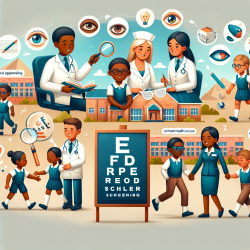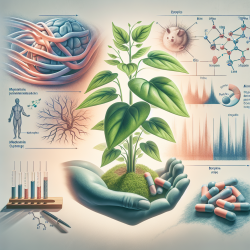Introduction
In the ever-evolving field of adolescent health, practitioners are constantly seeking innovative strategies to enhance outcomes for young individuals. The research titled "Modeling ecodevelopmental context of sexually transmitted disease/HIV risk and protective behaviors among African-American adolescents" offers a comprehensive framework that can significantly inform practice. This study underscores the profound impact of ecodevelopmental contexts on adolescent behavior, particularly concerning STD/HIV risk.
Understanding Ecodevelopmental Theory
Ecodevelopmental theory provides a robust framework for examining the interplay of multiple social systems that influence adolescent behavior. It emphasizes the importance of understanding the complex interactions between individual, family, school, and community contexts. The study highlights how these interactions can either mitigate or exacerbate risk behaviors among African-American adolescents.
Key Findings and Implications for Practice
The research identifies several critical factors that influence adolescent behavior:
- Parental Influence: A strong bond with parents, particularly fathers, was associated with reduced risk behaviors. Practitioners should encourage parental involvement as a protective factor.
- School and Peer Relationships: Positive school environments and peer influences were linked to healthier behaviors. Schools should foster supportive relationships and peer networks.
- Socioeconomic Status: Higher socioeconomic status indirectly reduced risk behaviors. Interventions should consider socioeconomic challenges and provide resources to support families.
Actionable Steps for Practitioners
Practitioners can leverage these insights to improve their interventions:
- Promote Parental Engagement: Facilitate programs that enhance parental involvement and communication with adolescents.
- Enhance School-Community Partnerships: Collaborate with schools to create environments that support positive peer interactions and academic success.
- Address Socioeconomic Barriers: Advocate for policies and programs that provide socioeconomic support to families, reducing stressors that contribute to risk behaviors.
Encouraging Further Research
While this study provides valuable insights, it also highlights the need for ongoing research. Practitioners are encouraged to explore how ecodevelopmental frameworks can be adapted to different cultural contexts and to develop interventions that address the unique needs of diverse adolescent populations.
Conclusion
By integrating ecodevelopmental insights into practice, practitioners can significantly enhance the health outcomes of African-American adolescents. This approach not only addresses immediate risk factors but also fosters long-term resilience and well-being. For those interested in delving deeper into the original research, please follow this link: Modeling ecodevelopmental context of sexually transmitted disease/HIV risk and protective behaviors among African-American adolescents.










